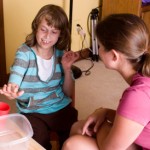
We have posted a number of times about the response of health services to the needs of people with learning disabbilites and recent reports have focused on the experience of people using general hospitals (see for example Mencap 74 Deaths and counting)
One response to this concern has been the development of the Learning Disability Liaison Nursing (LDLN) Services to provide additional, specialist support for patients, their carers and general healthcare professionals.
The researchers in this mixed-methods study were interested in looking at the impact of such a liaison service in four Scottish NHS boards.
They analysed 323 referrals over an 18 month period and carried out interviews and focus groups with 85 participants, 5 patients with learning disabilities, 16 carers, 39 primary care healthcare professionals, 19 general hospital professionals and 6 learning disability liaison nurses.
What they found was that referral patterns to the four liaison nursing services closely matched what is known about the health needs of adults with learning disabilities. Common admissions were due to neurological, respiratory and gastrointestinal issues.
The liaison role whilst complex, appeared to impact on three areas:
- clinical patient care:
- education and practice development;
- strategic organisational developments.
When the researchers looked at specific outcomes relating to the role, they found these to be linked to:
- issues relating to capacity and consent to treatment
- fostering person-centred adjustments to care
- augmenting communication
- providing positive role models and ambassadors for people with learning disabiltes
They conclude that the liaison services were all valued by stakeholders. They suggest that expert knowledge and skills enabled the liaison nurses to help develop effective systems and processes within general hospital settings.
They point out the need to take account of the
“complex and multidimensional nature of the LDLN role and the possible tensions between achieving clinical outcomes, education and practice developments and organisational strategic initiatives.
Learning Disability Liaison Nursing Services in south-east Scotland: a mixed-methods impact and outcome study, Brown, M et al., in Journal of Intellectual Disability Research, 56: 1161–1174
